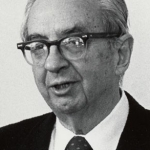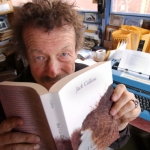Facing the wind of the avenues
one spring evening in New York,
I wore under my thin jacket
a sweater given me by the wife
of a genial Manchurian.
The warmth in that sweater changed
the indifferent city block by block.
The buildings were mountains
that fled as I approached them.
The traffic became sheep and cattle
milling in muddy pastures.
I could feel around me the large
movements of men and horses.
It was spring in Siberia or Mongolia,
wherever I happened to be.
Rough but honest voices called to me
out of that solitude:
they told me we are all tired
of this coiling weight,
the oppression of a long winter;
burn the expired contracts,
elect new governments.
The old Imperial sun has set,
and I must write a poem to the Emperor.
I shall speak it like the man
I should be, an inhabitant of the frontier,
clad in sweat-darkened wool,
my face stained by wind and smoke.
Surely the Emperor and his court
will want to know what a fine
and generous revolution begins tomorrow
in one of his remote provinces...
(1967)







Comment form: